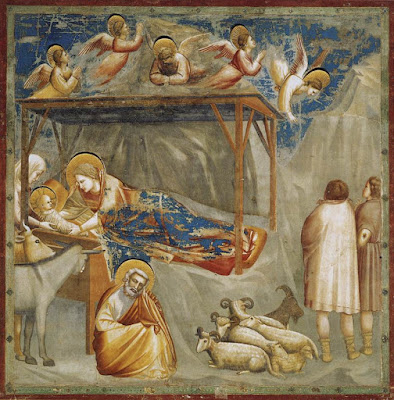God-With-Us: A Christmas Reflection
In the beginning was the Word,
and the Word was with God,
and the Word was God.
He was in the beginning with God …
And the Word became flesh
and made his dwelling among us,
and we saw his glory,
the glory as of the Father’s only Son,
full of grace and truth.
The Lord said to me: “You are my son; today I have begotten you.” As unlikely as these words (the Entrance Antiphon for Christmas Mass in the Night) may seem, they are a powerful reminder that there is more to the celebration of Christmas than the birthday of Jesus.
Every Christmas we celebrate the truth that God became a human being. This belief is so essential that to deny it or to try to explain it away is to give up the foundational belief of Christians. The Solemnity of Christmas invites us to pause and reflect on what these words really mean.
It is one thing to simply profess the words “and by the Holy Spirit was incarnate of the Virgin Mary and became man.” It is quite another to allow these words to effect a change in our lives. How the Polish Celebrate Christmas Eve As Cardinal Basil Hume observed, “The words are simple and direct, but their meaning is far beyond our power to comprehend. … But it is not flesh and blood that leads us to the truth. It is our Father in heaven who gives us the light to say ‘I do believe’ and with conviction. His touch is gentle. There is no force as he moves us to share his secret thoughts. He, Emmanuel, is God among us, a man to lead us where we truly belong, wrapped in his love for us” (The Mystery of the Incarnation, 142).
To say that Jesus is Emmanuel — “God-with-us” — requires a profound and dynamic statement of faith. But it is only faith that allows us, like the shepherds and sages of so many centuries ago, to make our way through the darkness to make our way to the manger, even as war, disease, poverty and the senseless loss of innocent life can make us ask, “Where is God?”
But what we, as people of faith, celebrate at Christmas is the reality that God is here, present among us. Ultimately, as Henri Nouwen wrote, Christmas means saying yes to something beyond emotions and feelings. It is saying yes to hope and the knowledge that salvation is God’s work, not ours: “The world is not whole. … But it is into this broken world that a child is born, who is called Son of the Most High, Prince of Peace, Savior. I look at him and pray, ‘Thank you, Lord, that you came... Your heart is greater than mine’” (The Road to Daybreak).
Originally written for Aleteia and posted on their site on December 24, 2015.
and the Word was with God,
and the Word was God.
He was in the beginning with God …
And the Word became flesh
and made his dwelling among us,
and we saw his glory,
the glory as of the Father’s only Son,
full of grace and truth.
—John 1:1–2, 14
The Gospel of the Christmas Mass “During the Day”
The Lord said to me: “You are my son; today I have begotten you.” As unlikely as these words (the Entrance Antiphon for Christmas Mass in the Night) may seem, they are a powerful reminder that there is more to the celebration of Christmas than the birthday of Jesus.
Every Christmas we celebrate the truth that God became a human being. This belief is so essential that to deny it or to try to explain it away is to give up the foundational belief of Christians. The Solemnity of Christmas invites us to pause and reflect on what these words really mean.
It is one thing to simply profess the words “and by the Holy Spirit was incarnate of the Virgin Mary and became man.” It is quite another to allow these words to effect a change in our lives. How the Polish Celebrate Christmas Eve As Cardinal Basil Hume observed, “The words are simple and direct, but their meaning is far beyond our power to comprehend. … But it is not flesh and blood that leads us to the truth. It is our Father in heaven who gives us the light to say ‘I do believe’ and with conviction. His touch is gentle. There is no force as he moves us to share his secret thoughts. He, Emmanuel, is God among us, a man to lead us where we truly belong, wrapped in his love for us” (The Mystery of the Incarnation, 142).
 |
| The Nativity by Giotto (ca. 1304) |
To say that Jesus is Emmanuel — “God-with-us” — requires a profound and dynamic statement of faith. But it is only faith that allows us, like the shepherds and sages of so many centuries ago, to make our way through the darkness to make our way to the manger, even as war, disease, poverty and the senseless loss of innocent life can make us ask, “Where is God?”
But what we, as people of faith, celebrate at Christmas is the reality that God is here, present among us. Ultimately, as Henri Nouwen wrote, Christmas means saying yes to something beyond emotions and feelings. It is saying yes to hope and the knowledge that salvation is God’s work, not ours: “The world is not whole. … But it is into this broken world that a child is born, who is called Son of the Most High, Prince of Peace, Savior. I look at him and pray, ‘Thank you, Lord, that you came... Your heart is greater than mine’” (The Road to Daybreak).
Originally written for Aleteia and posted on their site on December 24, 2015.



Comments
Post a Comment